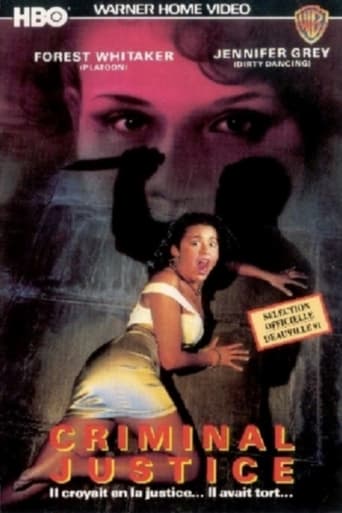ray_bradley
I've practiced law for 30 years. I've never seen any courtroom drama (except for perhaps "To Kill a Mockingbird") that comes anywhere close to this film in terms of brutal authenticity. The gut-wrenching hollowness that sinks into you with the deliberately unsatisfying ending is SO REAL and SO TRUE of a demonstration of how "the system" really functions, as to leave you in tears. The film is a beautifully crafted, unparalleled indictment of the fundamentally screwed-up justice system in this fundamentally screwed-up country. Whitaker is wonderful, and never gives away the truth of his character (whatever that might be). Anthony LaPaglia as the defense attorney is remarkable, as it the script. Rosie Perez's performance is of an intensity that is typical of the actress... she is never insincere, and, whether you're convinced by her obviously contrived sympathetic rantings or not, you WANT to believe her. The film is an un3expected gem with stunning performance all around
pjlb2008
As someone in the field, this story accurately depicts the process in the criminal justice system. I saw this story when it came out about 20 years ago. I recently saw it again. It is not dated at all. You have an all-star cast with well-developed characters. Perez is compelling as the victim. Whitaker presents as a sympathetic victim of the system. Lapaglia and Grey accurately portray overworked public servants. The judiciary is also overworked. They make it clear to the defendant that if he turns down the plea offer, and he is convicted, there will be grave consequences, not out of meanness but as a way to control their dockets. The case is presented from start to finish. The audience is given the information necessary to follow along. I liked the ambiguity as to whether Whitaker is in fact guilty. The end result is inevitable. As the Lapaglia character says at the end, "we all cut a deal." Lapaglia looks utterly helpless at the end of the movie, realizing he is caught in an endless loop of insanity. A thoroughly enjoyable movie from start to finish.
LeonLouisRicci
Dry account of the procedural path from crime to arrest to trial. This made for HBO movie is OK if not totally engaging.The major fault does not lie in the execution of the realistic portrayal but in the realistic problem of the overloaded court system. It is not overstated or made to be entertaining and so we have a picture as plodding as the procedure.The ending is bit of a letdown, however, as the stats show before the credits roll, ultimately right on realistic. It is that realism that handcuff this from being any more than a chronological account of an inherently involved process that leaves little to the imagination and a lot to the non-exciting plea bargain processes.A good primer for pre law students but at best an easy homework assignment for the rest of us.
CineManic
The synopsis/summary and the other two reviews gave the plot and basics of the story. I wanted to add that, as a former Brooklyn Assistant District Attorney, I found this film the most realistic depiction of a criminal case I've ever seen. All of the elements were accurate, including the heavy caseloads of the public defender and assistant D.A., the difficulty of working with witnesses, and the mechanics of trial and pre-trial preparation. I have to disagree with the reviewer (oeoaa) who thought the movie copped out at the end or that it revealed that the accused, Jesse Williams, was the actual rapist. I felt that the ending was still ambiguous regarding the accused's guilt. What it did was show was that, when faced with the actual reality of a trial where a guilty jury verdict would have meant a much harsher sentence, the accused decides to take the lighter plea. This is a very common result. Defendants often wait until the last possible moment to see the strength of the prosecutor's case and whether the complaining witness (i.e. the victim) will show up or prove to be a poor witness.


